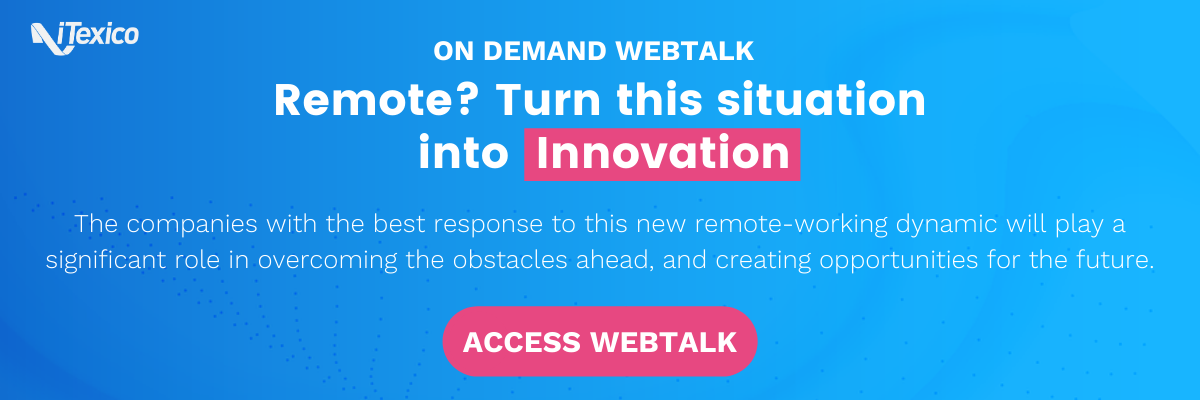Why Remote Teams Are the Future of IT
One of the most enlightening byproducts from the recent epidemic has shone a bright light on the nature of the average workplace. The assumption of the necessity of a concentrated workforce, bound together under a single building, has been so effectively integrated into our psyche that it became an erroneous norm. That’s how it’s been for centuries, that in order for orderly work to be accomplished, a designated office space must be established.
The thing is, we know better, and we have known for quite some time. It wasn’t until an unignorable opportunity presented itself that we were able to prove just how hopelessly unnecessary that forced workspace was. Right now, millions of people are working from home, doing the same job that they had been told couldn’t be done from a remote location. Times are changing, out with the old, and in with the new future for how IT, and most other jobs, can be done.
Now, Covid-19 was just the disaster that sparked this obvious revelation, but remote or distributed teams had already been becoming increasingly popular. Right now, according to Global Workplace Analytics, around ¼ of the U.S. workforce is telecommuting occasionally or permanently. With improvements in technology and now this pandemic that has forced us all to adapt to extreme circumstances, the idea of remote work as the future is hurtling toward reality.
You can’t drop a rock off a cliff and not expect it to fall. The change is inevitable, like gravity, and no business will come out of the crisis without changing to adapt to a newly discovered culture and processes. New technology has allowed companies to become more flexible in their work environments, which is phenomenal. Because of this, top IT specialists are beginning to demand more flexibility for themselves as well.
Why Remote Teams Are the Future of IT
You came here for the question and we’re gonna give you the answer. What is so appealing about the concept of remote teams that it will define where the IT field will go in the years to come? If this were a one word answer, you’d leave disappointed, but there is no one way to boil down an answer to a single concept. There are, in fact, several reasons that you can expect to see a greater rise in remote teams in the future.
1. Allows You to Attract and Retain the Best Talent
The millennial age group has established a certain fondness for breaking the mold of what has been traditional workplace practices. For instance, 85% of millennials prefer working from home, from the comfort of their own private workspace. Now, being in the IT field, and considering the scope of when and how technology has progressed, it’s easy to see why this age group in particular makes up the majority of the IT industry workforce.
Frankly speaking, the IT field is an attractive opportunity, especially for this demographic. It offers freedom and flexibility that many other fields simply lack. Therefore, offering remote work is a huge perk that will surely aid in employee retention. New generations demand new accommodations, which is as much appealing to modern preferences as it is adapting to an evolving environment.
By offering more opportunities to work from home, you are actively reaching out in a way that increases loyalty to a certain job because it allows for a bigger work-life balance. It’s the type of move that gets you noticed in a labor pool that is severely lacking in broad categories of fresh talent. Plus, you’ll even find that you can reach otherwise unreachable talent.
The key term here is remote, after all. Why do you need to be looking within your own sphere for new employees? If there’s a shortage of talent in your specific area, you can always look for remote workers outside your city or country that fit your criteria. The bottom line is that remote work expands your reach and strengthens your grasp. It’s a win- win: companies retain the best talent and reduce costs while employees get flexibility in their professional and personal lives.
2. It’s Cost Competitive
There are obvious gains to be levied here. Without relying on an office hub for your employees to conglomerate in, you end up saving a small fortune of cost-savings on your hands. The amount you’ll shell out to pay for infrastructure, office space, electricity, and so on will plummet so long as you have no need to provide it. But that’s small picture. Think big picture cost competitiveness.
Like we said before, opting for remote teams can go outside the bounds of your own company. For instance, say you have a huge project that you want to get going. Instead of running around the block, building a team and hiring new software developers to handle it, you can run with an outsourcing option. Big IT initiatives or projects can be outsourced to remote locations with distributed teams that will usually offer you top-skilled talent for a fraction of the price of hiring local talent. Yes, that includes remote local talent.
It hits the golden standard of what you want out of a cost competitive move: industry quality standards at a percentage of the price you would pay otherwise. Outsourcing can benefit virtually any company that has a stake in IT. Even IT and tech companies based in top tech hotbeds where overall costs are higher, like San Francisco or Silicon Valley, can find actionable benefits by dipping into remote work.
3. Allows for a Better Work-Life Balance
As an employer, you are responsible for the mental well-being, happiness, and comfort that your employees experience on a daily basis. That may sound like an unfair responsibility off the bat, but hear us out.
You want to run a good business, a profitable business. The only way you’re able to make that possible is through the assistance and skill set that your software developers offer to you. Their hard work makes the wheels turn and the engine thrum, they’re the lifeblood of your operation. Now, say you decide to double hours and cut their pay. How exactly do you expect that machine to run?
In order for your software developers to be as effective as possible, they need to be at the top of the game, and anyone who’s suffering under the weight of their work is physically and mentally incapable of delivering on the level of quality you’d normally expect from them. In essence, your worker’s happiness and well-being is directly correlated with how productive your business is.
Going down the cost-savings route at the expense of your workers won’t do you any favors. You’ll find that you can’t retain any talent that feels suffocated by their jobs. People have full lives outside of work, just like you do! Many people may even have larger lives outside the workplace, like working moms and dads who still have to come home and take care of a family after the workday is over.
Going remote gives your workers the freedom and flexibility to both do their job to the fullest extent while improving their work-life balance in the process.
4. It Reduces Job-Related Stress
Even people who love their jobs are strained by their working conditions from time to time. No matter how much you like your work, you’re still beholden to managers, deadlines, important phone calls, long hours, and large workloads. Working takes a toll on your mind and body, and a two-day weekend has never been a guaranteed amount of time to relieve that stress.
Because of the stress factors inherent in every work place, it places at the top reason for low productivity. The more stressed your workers are, the more it affects their performance and focus. Being in a workplace environment isn’t exactly conducive to easing the burden on that either, considering that designated areas for rest and relaxation come in limited quantities.
Funny enough, the comfort of being home tends to make up for what the workplace lacks. A comfortable, familiar environment doesn’t allow so much stress to build up because you can get up and take a break as needed. You’re free to make a fresh cup of your favorite brand of coffee, grab a bowl of your favorite snack, work in a familiar chair at a desk that you’ve truly made your own.
Being in full control of your own environment is what accounts for the best maintenance of your employees own commitment and productivity levels while simultaneously reducing job-related stress. Being given a chance to breathe and spread your wings is more capable of delivering a surplus of productivity than you could ever expect a separate environment. Your office space may be comfortable to a degree, but it’s just not home.
5. It Provides a Healthier Environment
Let’s talk a bit more about the environment of the average workspace. Office jobs are notorious for tedious, repetitive workdays spent confined in a small space, sitting for hours on end. These types of jobs that require long sitting periods (such as IT related jobs) have been openly and closely related to health problems and even early death in the long run.
The longer you sit, the less active your body is. This results in obesity, diabetes, high blood pressure, and more common ailments that can afflict your workers, damaging their health for years permanently. Office environments simply aren’t easily suited for encouraging lifestyles that counteract these issues. There isn’t enough opportunity, resources, or space to go around.
Remote work makes it possible to make up for these shortcomings. While at home, your employees are provided with more opportunities to apply healthy habits. Making healthier meals, doing home workouts, even as simple a practice of standing up while at the desk has a large impact on the average person’s health.
That’s not even mentioning the commute to work, ugh. No one likes getting up and suffering through early morning traffic. Even if you live close you may have to suffer through half an hour of backed up cars and roadblocks. Imagine what that’s like for someone who has to make an hour long commute five times a week. That’s two full hours each day devoted to absolutely nothing, unpaid and taxing on their car and their health. Take out that drive time and stress and you’ve got yourself a happier, healthier employee.
6. It Boosts Productivity and Creativity
Every step you take towards making your employees’ lives easier are seen and appreciated by those it affects. Remote workers will embrace the provided perks and flexibility you supply them with. People are not natural freeloaders, when they are given the means to live their fullest lives, they will reciprocate in kind.
Attention and care breeds loyalty. Workers who are provided for are willing to go the extra mile to prove their loyalty so long as they are treated well and with respect for their humanity and skill set. With more effort put into their projects, you’ll find that those who work from home will increase productivity while expressing their inherent creativity.
Plus, being home means they won’t have to be hassled with the distractions of a conventional office setting. There’s no coffee break gossip, no wandering minds from monotonous work days, no desire to escape from the workload by any means necessary. There’s time now, there’s space and consideration. With flexibility provided, productivity is increased.
With adequate management and communication, remote collaboration can feel as seamless as sitting in close cubicles, and remote workers won’t feel left out or inadequate. To learn more about how to effectively manage remote teams, visit our article for tips and suggestions for improved remote team management.
7. It Lets You Scale Up Better and Faster
The whole operational effectiveness that outsourcing provides is designed to sidestep the irritating processes you may otherwise be involved in when hiring new employees. Either outsourcing or seeking help from freelance employees means you won’t get caught up in a months long interviewing and hiring process, something no one enjoys.
Hiring remote talent is a freeing opportunity. No drawn out process for new hirees, no excessive expenditures to find just the right one. Finding people who are freely available to deliver high quality work at a lower price from anywhere not only means lower prices, but like we said before, you can access talent that may be out of your geography. Nowhere is unreachable.
Conclusion
Great talent doesn’t always live next door. However, even if you can’t pick up exactly what you need in your neighborhood, with the right collaboration you can fake it just the right amount. There are more people who fit the caliber of your organization and are ready to work than you realize, you just have to broaden your scope about where you look and what you can deliver. We can help with that.
iTexico is an Austin based company with delivery centers in Mexico that has experience with managing and providing distributed and remote teams for over 9 years, specifically delivering innovation for clients in the United States. These are new times and they take some getting used to. We can help make the transition smoother and easier. Contact us to learn more about our services.





Post Your Comment Here